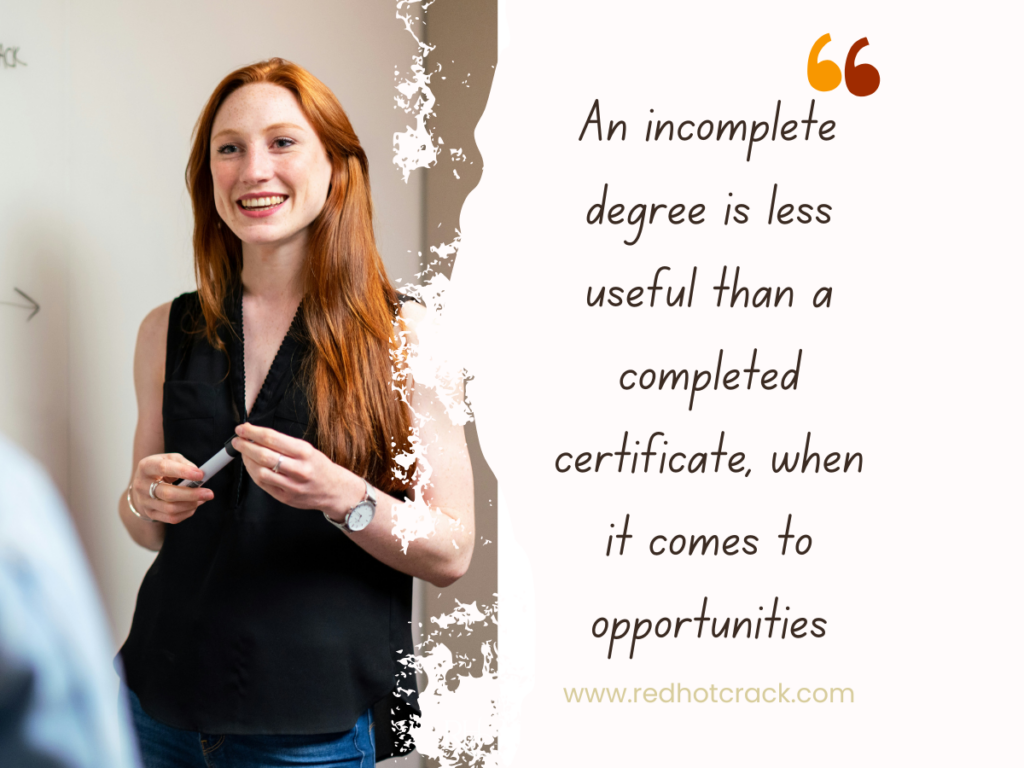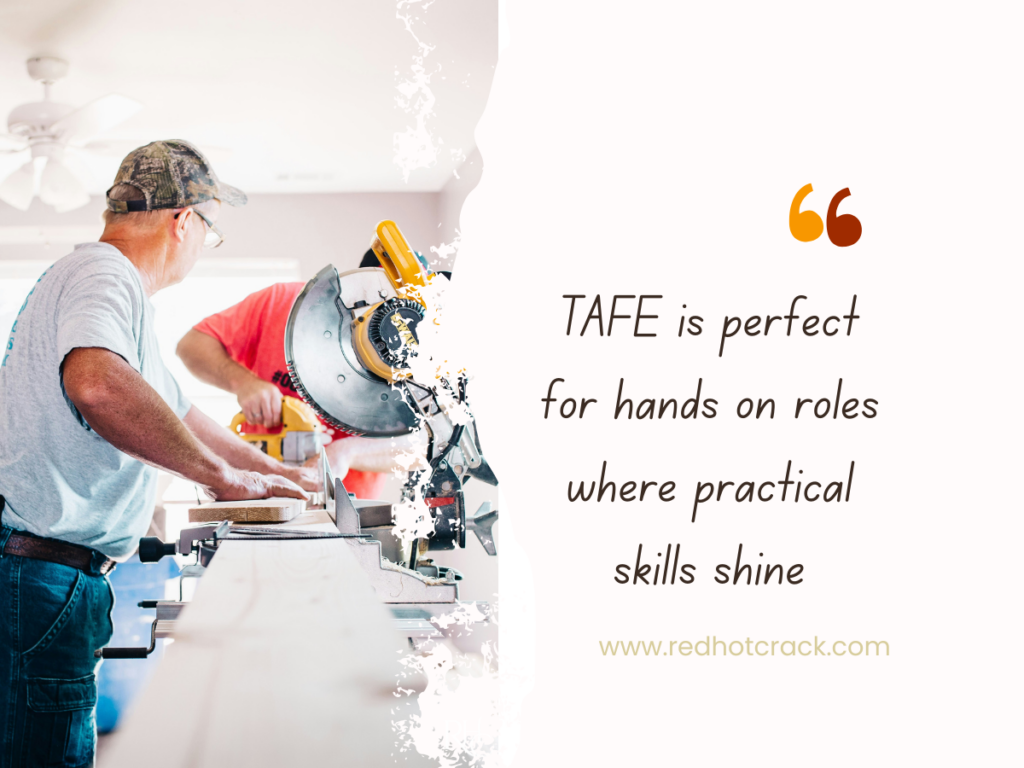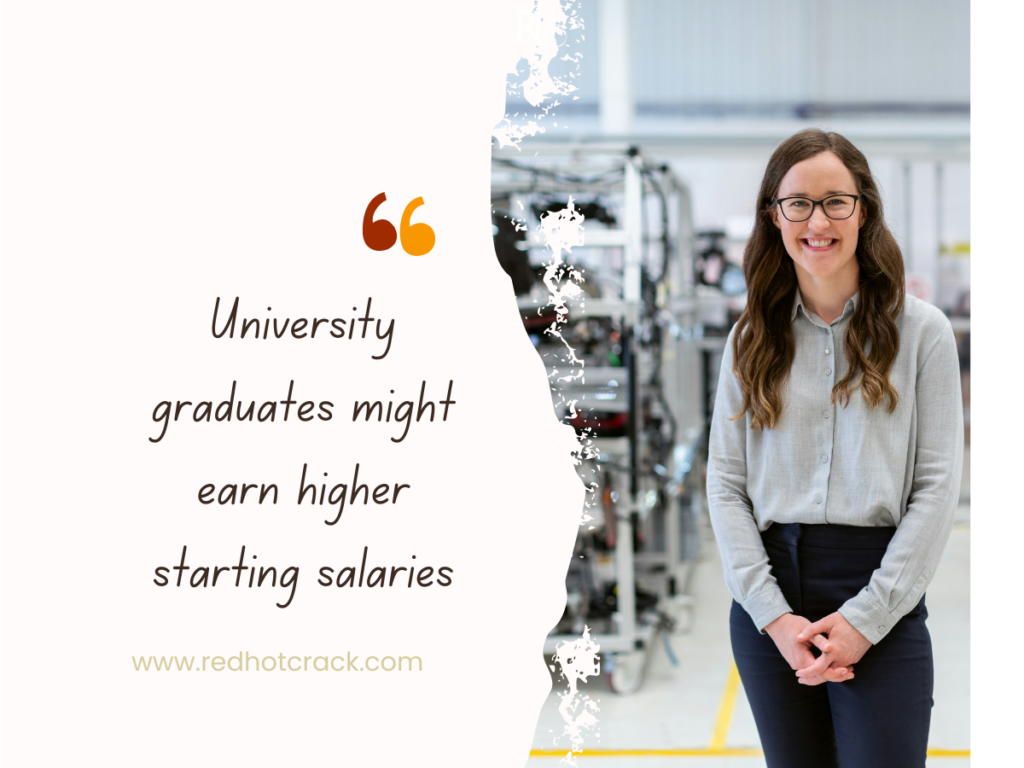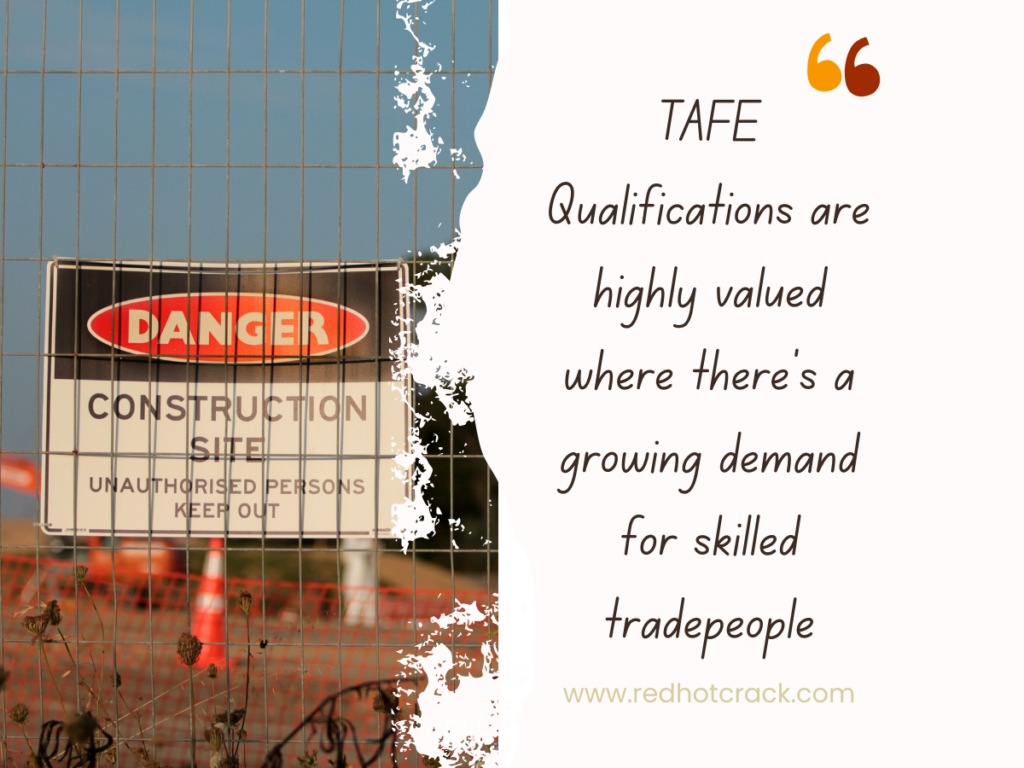Deciding between TAFE and university can feel incredibly overwhelming, especially if you feel like you are at a crossroads in your life… and it’s really no surprise as to why! Both pathways offer amazing opportunities, but which one is the right fit for you?
It seems like there are never-ending pathways for careers but I think it’s important to really think about what you want to achieve – not just in relation to your education but also what your goals are in life.
You might be looking to re-skill and change careers – or maybe you’ve recently become disillusioned with your day job and just want to do something different. Perhaps this year is finally the year you start your own business…. or you are ready to get formal recognition for your literal years of hard work!
Whether you’re a high school finisher, a working professional, or just someone looking to start fresh, this guide will help you compare TAFE and University to help you make the best choice for your career dreams.
Let’s define some terms used in this post
▶ Tafe & Further Education (TAFE)
Technical and Further Education TAFE schools teach practical skills for jobs so it’s good to think of TAFE as the place to learn practical skills that you will use in the workplace. TAFE institutions provide vocational education and training (VET) focused on practical skills for specific industries. They are often funded by the government and offer courses like certificates, diplomas and advanced diplomas.
For example: TAFE Queensland teaches skills for jobs like cooking (hospitality), building (construction), or working with children (childcare).
▶ University (UNI)
A University is a place of higher learning devoted to academic study so it’s good to think of a university as a place where people go to learn about different subjects and get higher-level qualifications. Universities teach subjects like science, art, and medicine – and focus on theoretical knowledge, research, and a broad range of disciplines. Universities are a higher education institution that offers academic and professional degree programs, including undergraduate and postgraduate qualifications such as Bachelor’s, Master’s and Ph.D programs.
Example: The University of Sydney helps people study to become doctors, engineers, or teachers through Bachelor’s, Master’s, and Ph.D. programs in various fields Medicine, Engineering, Education, or Business. .
🤑 Cost: What’s More Budget-Friendly?
One of the first things people think about is cost. Education is an investment, but it doesn’t have to break the bank! How much is your education going to cost you in the long run?
TAFE is typically a much more affordable option for many people – at all stages of their careers – with the Australian government offering Fee-Free courses to bolster skilled workers in some areas. When you compare that to a university degree which could cost $10,000 or more per year – it makes TAFE the much more affordable option – but does that make it the right option?
For someone looking to start earning while they are learning, the lower cost of TAFE can be a big advantage. In addition, Traineeships and Apprenticeships offer students an opportunity to gain valuable experience with dedicated employers while they complete their qualification – although keep in mind that while the employer is paying for your course, you’ll take a pay cut as a result. Consider how this might impact your finances, as it’s sometimes a better option to work an award wage role and pay the cost of TAFE yourself. Not always… but sometimes.
The government’s VET Student Loan (VSL) program assists eligible students in paying their tuition fees for approved higher-level (diploma and above) courses. This money is then paid back when you earn above the threshold for repayments.

💲 The Australian Government’s Contribution to VET
In 2023, government funding for Australia’s vocational education and training (VET) system came from both federal and state/territory sources, aiming to support skills development and workforce needs. Programs like Fee-Free TAFE emphasise accessibility by covering tuition for high-demand workforce areas. This funding includes direct contributions to public institutions, student loans, and support for various training initiatives.
Government expenditure on VET in 2023 was $10.9 billion, an increase of $12.9 million (0.1%) from 2022. This comprised of: ▪ $6.1 billion for VET delivery ▪ $3.3 billion for employer assistance to engage in VET ▪ $174.3 million for student assistance with equipment, travel and other costs ▪ $402.6 million for capital ▪ $866.0 million for system administration and governance.
For detailed data on funding flows and allocations, visit the report at NCVER.
That doesn’t mean that University isn’t the right path for you. If the high cost of university is a bit scary, the government’s Higher Education Loan Program (HELP) provides financial help for students to pay their Student Contributions, Tuition Fees, Overseas study expenses and student service and amenities fees.
It’s important to remember that while University fees can be deferred, University is better suited if you’re pursuing a highly technical role, like specialist healthcare, IT, Engineering or Business, where a degree might be expected. Many bachelor-level roles request multiple years of experience for well-paying roles, so it might be in your best interest to consider university to progress your career further.
👉 TAFE: Generally more affordable. While there are some free courses, a TAFE course can cost as little as $200, depending on government subsidies. At the high end, some long and linked courses might reach $19,000. The shorter duration also means less time out of the workforce.
👉 University: A bigger financial commitment in the long run. A university degree can cost anywhere from $10,000 to $40,000—or more if you’re studying specialised fields like medicine. Fees are applied at the census date, so it provides a chance for you to test out uni and see if it’s right for you.
If saving money is a big priority, TAFE might be the better choice for you but if you are looking to specialise in your industry, then University might be the right path for you. There’s more to consider.. so let’s keep going!
⏳ Duration: How Fast Can You Start Working?
Do you want to dive into the workforce quickly, or are you okay with spending a few extra years in school? If you’re eager to start earning and gaining work experience quickly, TAFE is a great option because students can earn while they learn through apprenticeships, traineeships and part time positions within their industry of choice.
Turns out, there is nothing wrong with going to university in your late 20’s or 30’s. I’m nearly 40 – but that’s not going to stop me from learning more and expanding my knowledge base! But… let’s be a bit realistic and compare a few roles.
⚖️ Compare an Early Childhood Educator vs a Primary School Teacher
A Diploma of Early Childhood Education and Care can be completed in about 18 months, allowing you to start working as a childcare educator shortly after.
On the other hand, becoming a primary school teacher through university would take at least four years of study, but it provides the qualifications needed for teaching at a higher level.

It’s important to think about how soon you want to join the workforce and the type of career progression you’re aiming for. Is it important for you to be working sooner rather than later, or do you have an opportunity to be supported while you complete your studies… An incomplete degree is less useful than a completed certificate when it comes to workforce opportunities.
TAFE: Many TAFE courses, like Certificates and Diplomas, take only 6 months to 2 years – even when you complete them at a part-time pace. You can gain job-ready skills and start earning sooner – and in some cases, earn while you learn!
University: Most university degrees require 3 to 4 years of full-time study. If you’re aiming for advanced roles, like becoming a lawyer, surgeon, or engineer, you’ll likely spend even longer pursuing postgraduate qualifications.
Think about your timeline. How soon do you want to see results? What’s important to you? You are the expert in the right decisions for you, so don’t make the decision right now – let’s look at the different ways you’ll learn!
📚 Career Focus: Hands-On vs. Theoretical Learning
The type of learning you prefer is a big factor in your decision. Are you a bit of a bookworm who loves researching? University might be where you really shine! But on the other hand, want to show you know something without having to write an essay? TAFE is most likely where you will feel most comfortable.
TAFE is perfect for hands-on roles where practical skills shine… so if your life goal is to run your own small business as an electrician, a Certificate III in Electrotechnology from TAFE teaches you all the practical skills you need to get started on that pathway and meet the licensing requirements. The skills you’ll learn during your apprenticeship as an electrician will set you up for success, and you’ll likely learn directly from someone who is running their own business.

Is it your dream to change the world in a small way? Maybe your dream is to run a large organisation as a CEO or research the next big breakthrough in virology… University is where you will learn the critical thinking, research and problem-solving skills you’ll need regularly in your career.
Want to make a practical difference in our community? Consider a TAFE education in nursing, community services, local government, or IT. These roles will see you begin a career with progression – if you choose to climb the career ladder.
University is ideal for professions requiring in-depth theoretical knowledge, such as becoming a doctor. In that case, you’ll study biology, anatomy, and other sciences extensively and follow a more formal pathway of education and training.
⚖️ Your choice should depend on whether you’re drawn to hands-on work or academic studies.
TAFE: Practical, hands-on training for jobs in industries like trades, healthcare, and IT. Want to become a chef, mechanic, or aged care worker? TAFE focuses on teaching you real-world skills to succeed in these fields.
University: More theoretical and research-based. If you dream of being a doctor, teacher, or engineer, university equips you with the critical thinking and qualifications needed for these roles.
Ask yourself: Do you enjoy hands-on learning, or are you drawn to deep dives into theory and research? Do you want to commit to a few years of education and studying or are you just wanting to gain some recognition for a job you’ve already been doing?
💰 Entry-Level Salaries: How Much Will You Earn?
Money matters! Let’s talk about what you can expect to earn with TAFE or university qualifications. With TAFE, you can start earning sooner so if you want to get into the workforce and start saving or supporting yourself sooner, TAFE might be a better fit.
⚖️ Compare a Plumber vs an Accountant
Completing a Certificate IV in Plumbing might take about a year and you could start earning around $60,000 as an apprentice plumber. In 2-3 years, you would have 3+ years of experience as a plumber, having first-hand experience in problem-solving – and you’d be in a prime position to run your own small plumbing business.
University graduates, like accountants, might earn higher starting salaries, often between $75,000 and $90,000 – but they spend an extra 3–4 years in school before earning that kind of money. When leaving university, you have limited real-world experience, albeit significant theoretical knowledge.

TAFE: You’ll start working sooner, which means you can begin earning earlier. While the initial salary might be lower than a university graduate’s, getting a head start can help you build experience and climb the ladder faster.
University: Graduates tend to earn higher salaries over a lifetime. However, it may take longer to reach this point since university degrees take more time to complete.
It’s a trade-off: quick earnings with TAFE or higher potential with university… but what about the future?
📈 Job Market Trends: Where’s the Growth?
Both TAFE and university open doors, but the right choice depends on the industry you’re aiming for.
TAFE qualifications are highly valued in industries like construction, where there’s a growing demand for skilled tradespeople. A Certificate III in Carpentry can lead to job roles as a carpenter or builder, both in high demand in Australia’s booming housing market.
For fields like medicine or engineering, university degrees are mandatory. If you want to be a civil engineer working on large infrastructure projects, a Bachelor’s degree is non-negotiable. It’s important to know what’s the “norm” for your industry. Just because there is a degree for it, doesn’t mean that’s what everyone needs to be successful in that industry – consider the IT industry… it’s entirely possible to be successful in the IT industry without a degree to back up your knowledge.

⚖️ Which Industry is right for you?
TAFE: Perfect for industries where practical skills are in high demand, like construction, childcare, or hospitality.
University: Essential for careers that legally require a degree, such as specialist medicine, law, or engineering.
Do some research on your desired career. Are employers looking for hands-on skills or higher education credentials? Job websites like Seek are an easy way to research the current job market and might help you decide if your financial goals align with the educational pathway you are following.
🤸♂️ Flexibility: What Fits Your Life?
Finally, ask yourself – Do you need flexibility in your studies?
Working part-time, being involved in community activities, or caring for your family might mean that TAFE’s flexibility can make balancing those other responsibilities easier.
⚖️ Learning at a time that works for you
Someone who hates working in retail during the day might take on a Certificate III in Business Administration through part-time evening classes – helping them gain the skills to move into an office role that has less contact with the general public.
Although, don’t discount University! It’s entirely possible to juggle a full time role while pursuing flexible online study in the evenings and on the weekends. University also offers flexibility, such as online learning, but juggling assignments and a heavier workload can be more challenging if you already have a pretty committed calendar.

If your life demands flexibility, look into whether Remote University or TAFE (Online/self-paced study) is available for the course you want to do. TAFE might suit you better, but university offers a broader range of options for those who can commit to more rigid class times.
TAFE: Often more adaptable, with part-time, online, and evening course options. Great for those juggling work or family responsibilities.
University: Some universities offer flexibility, but the workload can be heavier.
If balancing life and study is a concern, TAFE might feel more manageable. Feel like you need something to fill about 30 hours a week? University might fill that gap for you. Flexibility in your studies can make a huge difference.
❓ What’s the Right Choice for You?
Unfortunately, there’s no one-size-fits-all answer. What’s right for me, might not be right for you and that’s OK! You are the expert in your own life and the best choice depends on your goals, lifestyle, and budget.
Here are some questions to ask yourself:
- Think about your dream job. Does it require a degree, or are skills and experience more important? Research about what the career is like – if you can, speak to someone in the industry!
- Consider your finances. How much can you afford to spend, and how soon do you want to start earning? Are you able to take time off for your studies or do you think your studies will negatively impact on your life?
- Look at your learning style. Do you prefer practical tasks or diving into theory? Do you like writing essays or do you just want to get it over with so you can go to work?
What’s Your Story?
Have you chosen TAFE or university? Or maybe you’re still deciding! Share your experiences or questions in the comments below. Your story could help someone else make their choice.
No matter which path you take, remember: both TAFE and university can lead to a successful and rewarding career. It’s all about what works best for you.
Till next time.
Sammie

